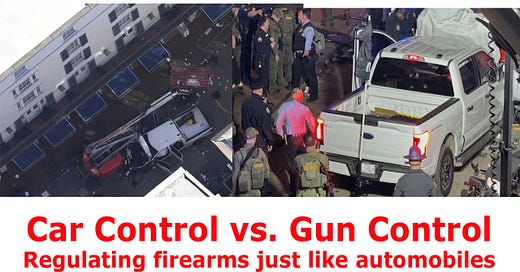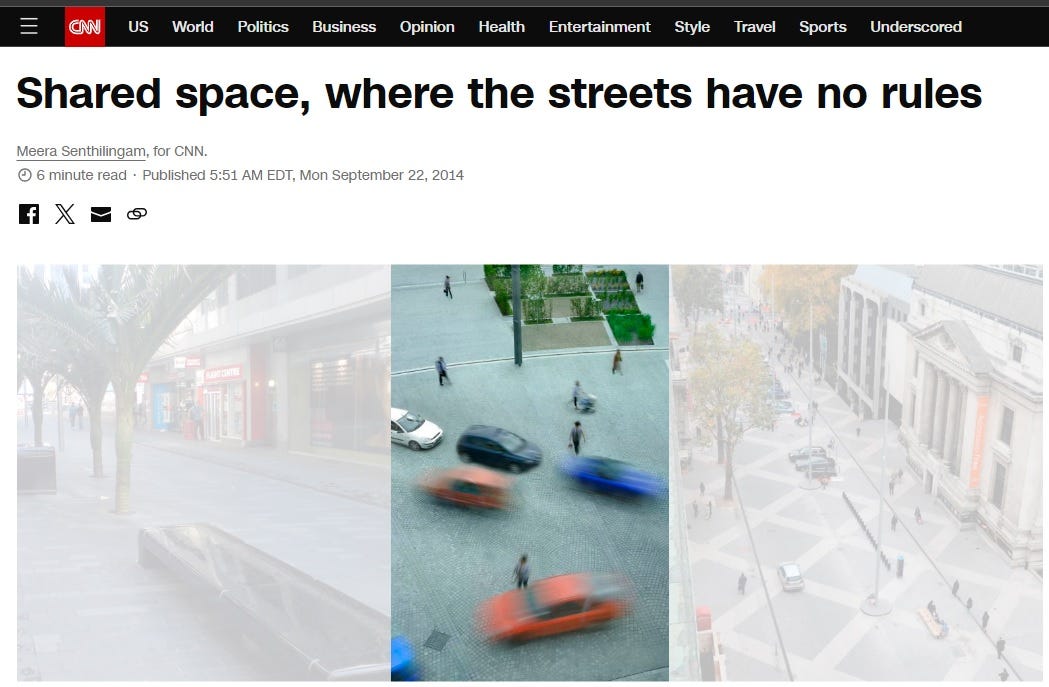Car Control vs. Gun Control
In light of recent attacks, analyzing "you need a driver's license to have a car, so gun owners should do the same thing."
“You should be required to get a license for a gun just like a car.” So says one approach from firearm prohibitionists pushing for more legislation and restrictions. This has numerous problems:
No restrictions, licensing, registration, or insurance requirements exist to own a vehicle, provided you don’t drive it in public.
It is stunningly easy to rent a motor vehicle, even as a visitor in a foreign country. I’ve rented cars in different countries that never bothered to verify whether I knew which side of the road they drove on.
It’s a false assumption that driver’s licensing has been effective at improving safety.
Does “car control” even work?
TL;DR - The kind of pre-license driver safety training programs gun control advocates evangelize doesn’t work as well for cars as many believe.
There are numerous problems with the “car control” argument as no good studies demonstrate that government-mandated driver licensing reduces total accidents/fatalities after controlling for other confounding variables. Examples:
https://www.sciencedirect.com/science/article/pii/S0925753512001786 - Is there a case for driver training? A review of the efficacy of pre- and post-licence driver training
The results of the review indicate that some forms of training have been effective for procedural skill acquisition and other programs have been found to improve drivers’ hazard perception. Conversely, evidence suggests that traditional driver training programs (i.e., classes before you get your license in the first place) have not reduced young drivers’ crash risk. Caution is urged when interpreting this finding as major methodological flaws were identified in previous evaluation studies, including: no control group; non-random group assignment; failure to control or measure confounding variables; and poor program design. Further, the validity and usefulness of crash rates as an outcome measure is questionable. More robust research should be undertaken to evaluate driver training programs, using more sensitive measures to assess drivers’ onroad safety.
2) https://www.ncbi.nlm.nih.gov/pmc/articles/PMC1765489/pdf/v008p00ii3.pdf - The safety value of driver education and training
Background: New drivers, especially young ones, have extremely high crash rates. Formal instruction, which includes in-class education and in-vehicle training, has been used as a means to address this problem.
Objectives: To summarize the evidence on the safety value of such programs and suggest improvements in program delivery and content that may produce safety benefits.
Methods: The empirical evidence was reviewed and summarized to determine if formal instruction has been shown to produce reductions in collisions, and to identify ways it might achieve this objective.
Results: The international literature provides little support for the hypothesis that formal driver instruction is an effective safety measure. It is argued that such an outcome is not entirely unexpected given that traditional programs fail to address adequately the age and experience related factors that render young drivers at increased risk of collision.
Conclusions: Education/training programs might prove to be effective in reducing collisions if they are more empirically based, addressing critical age and experience related factors. At the same time, more research into the behaviors and crash experiences of novice drivers is needed to refine our understanding of the problem
3) https://trid.trb.org/View/1160556 - The effectiveness of driver training as a road safety measure: a review of the literature
The effectiveness of driver training as a road safety measure is a controversial issue within the professional and public arena. The worth of driver training for car drivers as a means of improving driver behaviour and reducing road crash involvement is continually debated in Australia and overseas. In an effort to inform road safety professionals, and the public at large, about the merits and effectiveness of such training as a crash countermeasure, RACV commissioned RCSC Services Pty Ltd to perform an extensive review of the international literature concerning driver training. In particular, the effectiveness of driver training programs for learner drivers, young/recently licensed drivers and experienced drivers was investigated. The review suggests that driver training cannot be considered an effective crash countermeasure and that other approaches such as increased supervision and graduated licensing for novice drivers are likely to make greater and more lasting contributions to road safety.
The kind of "car control" that gun prohibitionists are demanding for firearms doesn't even work that well for cars! The literature indicates that government-mandated driver safety training programs do not significantly alter the outcomes of crashes; rather, driving experience creates safer drivers. There’s a reason driver’s insurance rates are notably higher, and many rental companies have a surcharge for drivers under the age of 25, especially for males.
NOTE: This is NOT a claim that education or training is bad or ineffective, only that government mandates usually are. Hands-on experience is the best teacher and good instruction helps. The lesson we should learn from cars is introducing guns to people when they’re interested and ensuring they know how to handle them safely and with respect is ideal. An arbitrary, government-imposed barrier to entry is not a solution.
This is why hunter education works:
But mandatory qualification programs often do not:
Less Government Interference is Better
Both gun owners and drivers who are experienced and respectful do better with fewer restrictions. Civilian gun owners typically experience a lower negligent discharge rate than government personnel. Several formal studies document that reducing restrictions and government requirements increases driver safety.
Experiments have found that busy junctions where two or three people had been knocked down and killed every year dropped to a zero death rate when they took the traffic lights away and put a tree in the middle of the street instead.
Ben Hamilton-Baillie, an urban design specialist and consultant to the Institution of Civil Engineers, said towns and cities should be redesigned. “This kind of thinking is spreading from the Netherlands through Sweden, Denmark, Austria, Germany and Belgium and there are signs it is being picked up here and could represent the future on our streets,” he said.
“Obviously, you cannot bring this kind of thing in overnight - but if you phase it in then people learn to think differently and motorists take responsibility for their actions,” he said.
Gun control schemes such as attempted assault weapon bans are manufactured and not based on data or with any interest in helping people:








You'd be amazed by how many people think you need a driver's license to buy a car!
On a more.... interesting note, back in the early 10s, I heard that one reason a local city had issues with employment for its inhabitants was that half the people driving were doing so illegally.